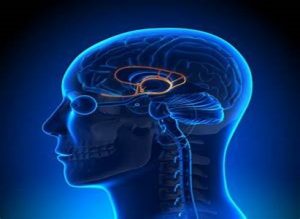 |
Role of Hippocampus:
The hippocampus is a region in the brain located between the inner folds of the temporal lobe. This region plays an especially important role in the formation of two specific types of memories. These include spatial relationship and declarative memories. Spatial relationship memories help us derive directions whereas declarative memories are related to the facts and events. These two types of memories help transform short term memories into long term memories and then they will be stored elsewhere. More information on the role of the hippocampus and memory can be found at https://www.positivemed.com/2018/06/02/role-of-the-hippocampus/.
How the Hippocampus Relates to Anxiety:
The hippocampus is an important area to look at when studying anxiety. When an individual undergoes chronic anxiety, they have an increase in glucocorticoids which are hormones that contribute to the flight or fight response. This increase in glucocorticoids causes a raise in cortisol levels which ultimately impairs the fragile hippocampus.
One major impairment to the hippocampus from chronic anxiety is the decrease in this regions size. Many studies have proven that individuals undergo a shrinkage of their hippocampus if they are under sever anxiety. Decreasing of size in any area of the brain is not ideal and, in this case, memory formation becomes extremely hard. When one loses volume in their hippocampus, that means they also lose storage space for all the memories that are within the spatial relationship and declarative memory categories. These memories are often used to pull certain events together and create a memory. Less volume equals less memories formed.
Alzheimer’s Disease and Anxiety:
Following the chain of events within anxiety we can trace our way to Alzheimer’s disease. Individuals with Alzheimer’s disease struggle with memory formation and retrieval. To no surprise the hippocampus is playing a large role in this disease. Those with Alzheimer’s also show a decrease in volume to their hippocampus. It is no coincidence then that individuals with anxiety are more likely to develop Alzheimer’s.
Can You Grow What Has Been Lost?
After reading about the negative impacts anxiety has on the hippocampus region of your brain, one questions the possibility of healing. When chronic anxiety levels have become so high that physical volume in your brain starts to decrease, what can one do to help? Although treatments are subjective to the individual, researchers passionately believe that you can slowly grow volume size back. Through Exercise one can start to create new hippocampus neurons which ultimately leads to increase of size. Exercising with the balance of a good diet will help increase the hippocampus. Studies also show that challenging yourself with brain training will also help memory function and increase volume in the brain region. More information of the explanation of these “treatments” can be found at https://www.growthengineering.co.uk/train-your-hippocampus/.
Conclusion:
Overall, it is evident the severe complications anxiety can cause. With the increase of glucocorticoid and cortisol levels, the hippocampus Is proven to shrink. Shrinkage in this region of the brain leads to memory formation issues which later on can cause further complications such as Alzheimer’s disease. Trying to avoid the difficulties of anxiety can be very tough but one can help themselves which some daily changes.